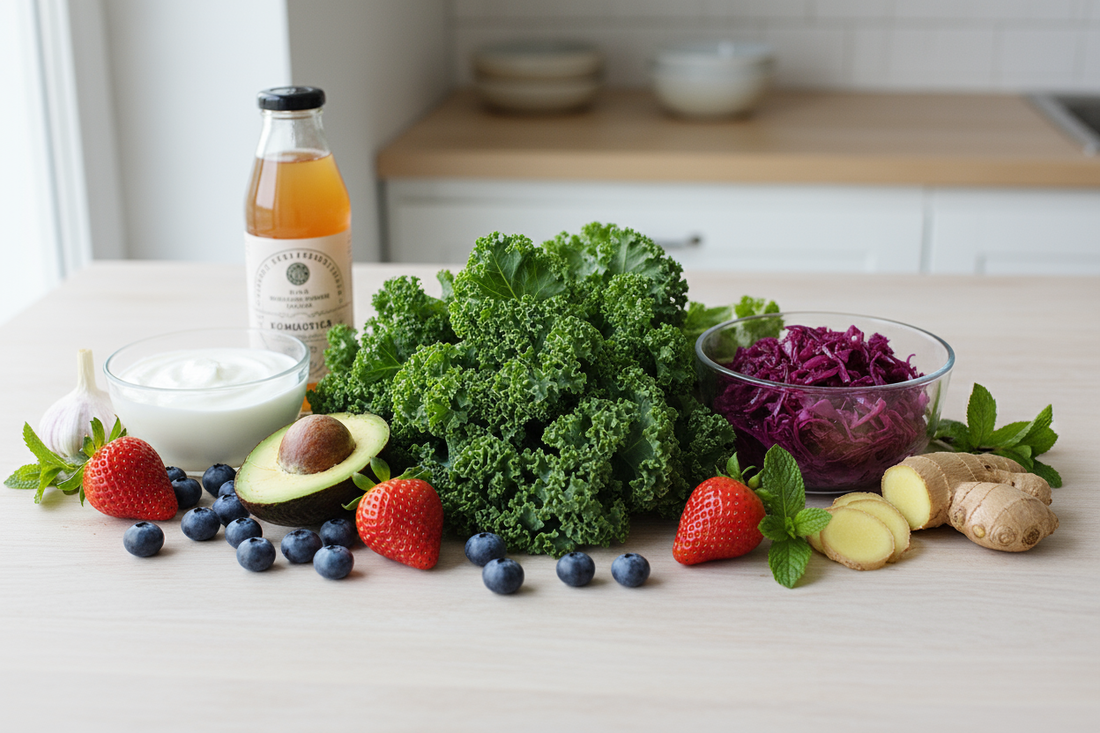
How to Do a Gut Reset Safely (Backed by Science)
Share
If you’ve been feeling bloated, tired, or off balance lately, your gut might be trying to tell you something.
A gut reset isn’t about extreme cleanses or quick detoxes—it’s about restoring balance to your gut microbiome, the community of trillions of bacteria that directly affect digestion, mood, and inflammation.
Here’s how to support your gut health naturally and safely—using evidence-based nutrition and functional medicine principles.
What Is a Gut Reset?
A gut reset is a short-term focus on eating habits and lifestyle choices that help your digestive system rest, repair, and rebalance its microbiome.
Rather than “flushing out toxins,” the goal is to remove irritants (like processed foods, added sugars, and alcohol) while adding nourishing foods that promote microbial diversity—especially fiber, antioxidants, and prebiotics.
According to the Cleveland Clinic, “you can improve your gut health naturally by eating more whole foods, focusing on fiber, staying hydrated, and reducing stress.”
These small, consistent habits—not extreme cleanses—create the foundation for better digestion and overall health.

Why Gut Health Matters
Your gut isn’t just where digestion happens—it’s central to your immune system, metabolism, and even brain health.
Over 70% of immune cells live in the gut, and the microbiome communicates directly with your brain through the gut-brain axis.
Research from Johns Hopkins Medicine shows that this gut-brain connection affects everything from mood to inflammation levels. When your microbiome is out of balance—often due to stress, low-fiber diets, or antibiotics—it can lead to fatigue, bloating, and food sensitivities.
“An imbalanced microbiome can influence inflammation, digestion, and even mood,” notes Dr. Raphael Kellman, a pioneer of functional medicine who coined the term "Microbiome Medicine".
How to Safely Do a Gut Reset
A gut reset doesn’t require harsh detoxes. It’s about nourishing and supporting your gut’s natural repair systems through targeted nutrition and lifestyle changes.
1. Focus on Fiber-Rich, Plant-Based Foods
Fiber feeds your beneficial gut bacteria—especially soluble fiber found in vegetables, legumes, fruits, and seeds.
According to the Mayo Clinic, adults should aim for 25–38 grams of fiber daily to promote healthy digestion and microbial diversity.
2. Add Fermented and Prebiotic Foods
Foods like sauerkraut, kimchi, miso, kefir, and yogurt (if tolerated) introduce probiotics—beneficial bacteria that improve digestion and immunity.
Prebiotic foods (like onions, leeks, garlic, asparagus, and oats) feed those probiotics to help them thrive.
A 2021 study in Cell found that eating fermented foods increased microbial diversity and reduced inflammatory markers within weeks (Wastyk et al., 2021, Cell Journal).
3. Eliminate Gut Irritants
Temporarily remove or limit foods that stress the digestive system:
-
Added sugars and refined carbs
-
Processed oils and artificial sweeteners
-
Alcohol
-
Gluten, dairy, soy, or corn (common sensitivities)
These foods can promote dysbiosis (microbial imbalance) and inflammation, according to the Harvard Health Publishing.
4. Stay Hydrated
Your digestive tract needs water to move food and waste efficiently. Dehydration slows digestion and can worsen bloating and constipation.
Johns Hopkins Medicine recommends consistent hydration throughout the day for optimal gut function.
5. Manage Stress and Sleep
Chronic stress disrupts the gut-brain axis and alters bacterial composition.
Harvard researchers note that poor sleep and high stress can negatively affect gut microbiota, leading to immune and metabolic changes (Harvard Health, 2023).
Simple habits like deep breathing, light exercise, and 7–8 hours of sleep can make a measurable difference during your gut reset.

The Functional Medicine Gut Reset (Food as Medicine)
Functional medicine takes a food-as-medicine approach: removing what harms the body and adding what heals it.
That’s why Organic Pharmer’s doctor-designed Anti-Inflammatory and Detox Cleanses are built around gut-reset principles.
Each program includes:
-
100% Organic Ingredients to reduce toxin exposure
-
Plant-Based Fiber & Antioxidants to feed gut bacteria
-
Anti-Inflammatory Herbs like turmeric, ginger, and fennel
-
Balanced Caloric Intake to avoid nutrient depletion
“Our goal isn’t detox—it’s renewal. A well-designed cleanse should calm inflammation, rebalance digestion, and help you reconnect with real food.”
— Michael Petronaci, CEO Organic Pharmer
Start your reset with the Organic Pharmer Gut-Health Resets, created to gently support your microbiome and restore your body’s natural rhythm.
Important Safety Note
The National Center for Complementary and Integrative Health (NCCIH) cautions that many commercial “detox” diets make unproven claims.
Always consult your healthcare provider before making significant dietary changes—especially if you have a medical condition or are pregnant.
This guide is for educational purposes only and should not replace medical advice.
The Bottom Line
A safe, effective gut reset is not about deprivation—it’s about nourishment and microbiome balance.
When done properly, it can:
-
Reduce bloating and inflammation
-
Support digestion and immune function
-
Boost energy and mood
-
Help re-establish healthy eating patterns
A short, doctor-designed gut reset rooted in organic, plant-based nutrition is the most sustainable—and science-supported—way to give your digestive system the fresh start it deserves.
Ready to reset your gut naturally?
Explore Organic Pharmer’s Functional Gut Resets and Programs →
References
-
Harvard Health Publishing – How Stress Affects Your Gut and What to Do About It
-
National Center for Complementary and Integrative Health – Detoxes and Cleanses: What You Need to Know
-
Wastyk, H. C., et al. (2021). Gut-microbiota-targeted diets modulate human immune status. Cell, 184(16), 4137–4153.
